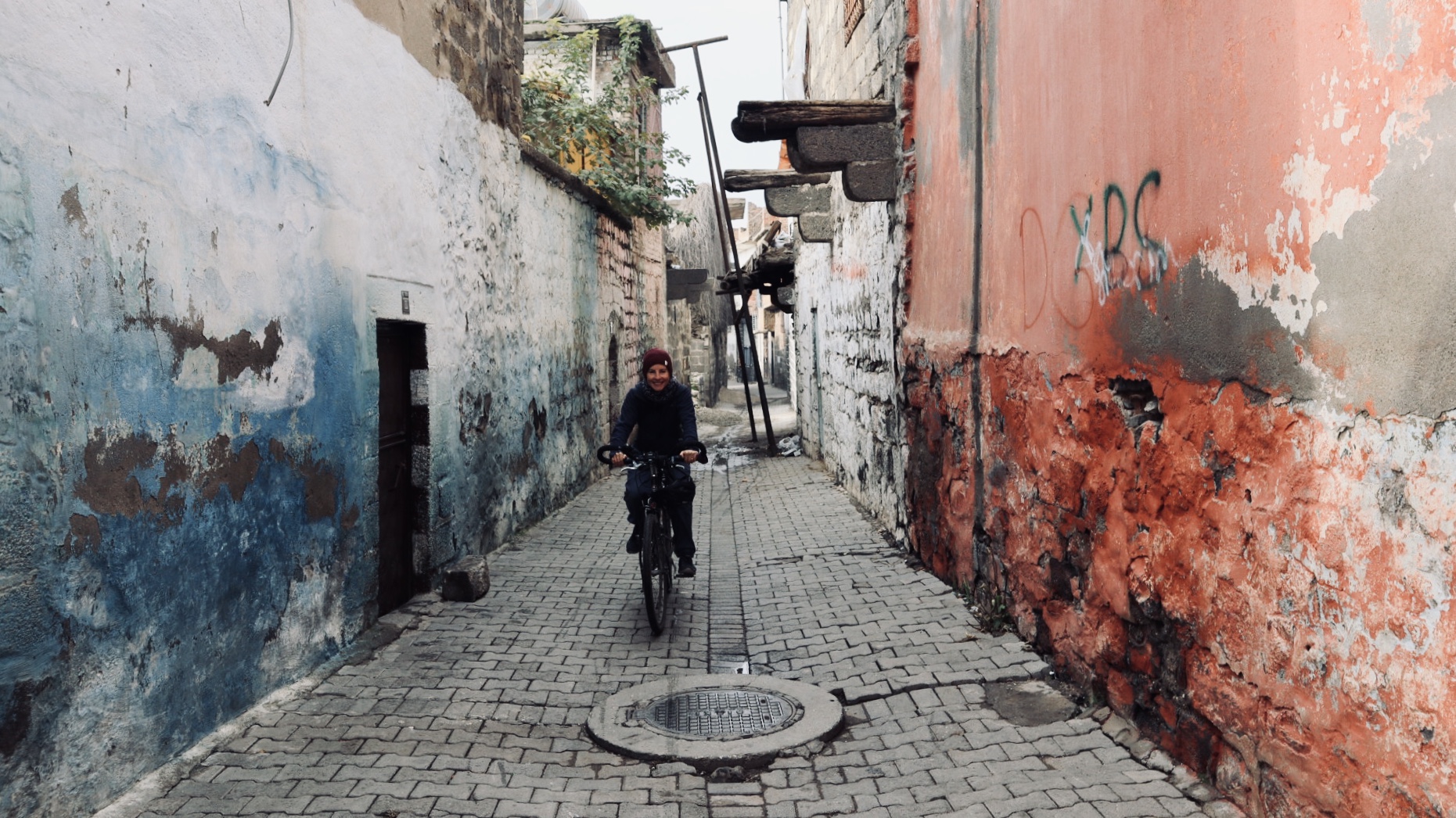Fortunately the drive to Diyarbakir is short, but all the more damp and cold. The fog is so thick that we can only see about 30 meters. Shortly before entering the city, we are waved aside by a guy with a bulletproof vest and a large Kalashnikov at one of the conspicuously more frequent police checkpoints. We expect that once again our passports will be photographed, but the guy introduces himself as Michael, speaks quite good English and asks us to warm up our numb hands at the brazier behind the bulletproof protective wall. We chat about traveling, snowboarding and Turkish food, and are finally invited to join the (vegi!) barbecue. What an unexpected welcome encounter!
The Kurdish areas – or Kurdistan – are officially classified as dangerous and terrorist. This obviously entitles the government to make blanket suspicions about the Kurds, to set up security cameras everywhere, to check traffic at numerous checkpoints, to justify a very high police presence, to patrol with armored vehicles, and to subtly harass the proud people in various other areas of life.
We have come to know Kurdistan quite differently so far. The people are incredibly warm and hospitable and met us seemingly without prejudice. Without exception, we felt very safe and welcome and in many places it was not even necessary to lock our bikes. The Çay, the bread, the mandarins went far too often on the bill of the respective salesman- resistance futile. The mistrust and prejudices within Turkey are sad – and unfortunately as old as Turkey itself.
In Diyarbakir we first stay with Ferat and his family. Two nights become three and after a side trip to the ancient city of Mardin we are allowed to spend three more nights with Tugba and her boyfriend Serhat. We have to sit out the rainy weather, give our legs a decent rest and plan our further itinerary. Our original plan to fight our way through to Van despite the winter weather and from there to continue our journey to Georgia by buses comes into question after Serhat shows us pictures of frozen foxes from this region. Why does this throw us off our plan? The foxes are not frozen asleep, but in the middle of their movement! So we reschedule and soon it is decided that we will drive up from Diyarbakir directly to Tunceli and from there we will take the bus over the following three passes above 2000 meters altitude.
After the unexpectedly long break we are incredibly happy to pack the bikes again and start pedaling again. Saying goodbye to Tugba, on the other hand, is difficult, we have grown very fond of her.
The sun is shining, the temperature is bearable and soon we leave the suburbs of the big city behind us. The ugly main road gradually narrows and we are once again on our way to the mountains. A challenge when driving in the winter months are the very short days. At four o’clock it gets quite cold and at five o’clock the daylight is already gone. At night it is now always cold, depending on the place also damp and we (me!) are happy when we find somewhat protected campsites. We find. In a village with the fancy name “Maden” we move without further ado into an empty glass house on the playground. We don’t know what the purpose of the house is, but the tent and our luggage fit perfectly inside. Although we are in a very public place, we remain undiscovered during the night.
The next morning greets us first with rain, but then decides to change and we ride in flurries on winding roads through the attractive hilly and mountainous landscape. Despite the somewhat rough weather, we enjoy the ride, but our progress is slow. Again and again we pass small police stations, all manned and armed and… heated! We accept the third invitation shivering and soon find ourselves next to a roaring stove in a raised concrete house. Two doors, windows all around, they hand us tea and let us thaw out. They are responsible for security, says the youngest soldier in the group. But no, nothing has ever happened here. But there is terrorism. PKK! The Kalashnikovs are in a corner, hanging on coat hooks. The soldiers chop parsley, tomatoes and hot peppers. “We smoke, cook, play with our cell phones and do friendly fights,” says the young soldier in response to our question about how they pass the time here in no man’s land. Of course, today we are invited to join them for a midday snack. They are cooking on the stove in a large iron pan. Ilyas expertly mixes the prepared ingredients, reduces the quantity and then adds some eggs. A little salt and the delicious meal is ready.
It takes some effort to leave the warm fortress again. But freshly strengthened and warmed up, we tackle the next climbs and chilling descents. Also today a frosty night is in store. We hope for an empty hut to be somewhat protected from the cold. But far and wide there is nothing but rocks, steep mountain slopes and icy streams. This could be a cold night! Before we fight our way up another steep section, we branch off onto a side road from which various minibuses with workers are rumbling towards us. We suspect another mine and hope for our empty hut. We drive around another bend and immediately spot a suitable place. However, the small blue house is already on the mine site and thus behind the well-guarded barrier. We have little to lose and so we dare to try. The questioning expressions on the faces of the handsome men in black uniforms quickly give way to friendly grins and we are unceremoniously waved onto the site. A younger one is charged with sweeping out the blue cottage and firing up the old stove inside, while we are invited into the raised guardhouse. You might guess: no point in arguing back!
Sometime between tea and dinner it is decided that we will not sleep in the blue house in the tent – çok souk (too cold) – but in the guard house with a heater.
The guards tell us that the mine belongs to the Eti Krom company, that the tunnel leads about four kilometers into the mountain, that they work 24 hours a day in shifts and that about 80 trucks a day leave the site fully loaded. At some point the guards actually let us have the cottage for the night, we push the benches together, admire the snow flurry through the windows and are very pleased with our home for today.
The next day we reach our stage destination Tunceli (Demir). In the friendly Kurdish town we spend two cold but sunny days. We cook our Christmas dinner in the noble hotel room, explore the wonderful surroundings without luggage and feel a bit like on skiing vacations thanks to the snow mountain panorama. On the third day we squeeze all our equipment into the belly of a large coach that takes us over three steep, snowy passes to Trabzon on the Black Sea coast.
For three days, in perfect weather, it’s now a case of “head down and pedal” to get the almost 200 kilometers on the noisy highway behind us. Here on the coast, space is tight, the apartment blocks are tall and ugly, and the people seem a bit more reserved at first glance. We are incredibly glad that we drove through Turkey in a sweeping zigzag line for nine weeks and were able to immerse ourselves wonderfully in all the different regions, cultures and family histories.
In Hopa we stay for one day, because we need a PCR-test for the entry to Georgia. During a short walk away from the traffic chaos of the East-West axis we realize: The area here also quickly becomes wild and romantic with steep hills, tea plantations, fruit trees and clear mountain streams.
But we now feel ready for the next country: Georgia, here we come!


